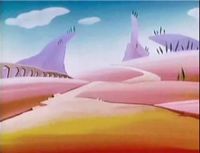Linguini Empire: Difference between revisions
From the Super Mario Wiki, the Mario encyclopedia
Jump to navigationJump to search
Sir Grodus (talk | contribs) mNo edit summary |
Apikachu68 (talk | contribs) m (→Names in other languages: Added citations.) |
||
| (27 intermediate revisions by 18 users not shown) | |||
| Line 1: | Line 1: | ||
[[ | {{location infobox | ||
The ''' | |image=[[File:LinguineEmpire.jpg|200px]] | ||
|first_appearance=''[[The Super Mario Bros. Super Show!]]'' ("[[The Great Gladiator Gig]]") (1989) | |||
|greater_location=[[Mushroom Kingdom]] | |||
|inhabitants=[[Brutius Maximus Grouchimus]], humans | |||
}} | |||
The '''Linguini Empire''' is a vast kingdom similar to ancient [[Rome]] or {{wp|Greece}} which was seen in ''[[The Super Mario Bros. Super Show!]]'' episode "[[The Great Gladiator Gig]]". It is named after the food dish, {{wp|Linguine|linguini}}, a food of Italian origin. | |||
As mentioned above, the | As mentioned above, the Linguini Empire resembles ancient Greece or Rome, having several large, pillared houses in it, as well as [[Linguini Empire Colosseum|a colosseum]]. The empire is apparently ruled by an emperor, and its main mode of transportation seems to be horse-pulled chariots. A large system of aqueducts can also be seen in the empire. | ||
== | ==Names in other languages== | ||
{{foreign names | |||
|ChiS=林圭尼帝国 | |||
|ChiSR=Línguīní Dìguó | |||
|ChiSM=Linguini Empire | |||
|ChiSC=<ref>[https://m.youtube.com/watch?v=rVPsTQsrH-g Super Mario Brothers Super Show - Bonkers form Yonkers | Learn Chinese | Cartoons in Mandarin]</ref> | |||
|Ita=Impero Linguine | |||
|ItaM=Linguini Empire | |||
|ItaC=<ref>[https://www.youtube.com/watch?v=A8R_vVoD3mE&list=PLcGZc7g30V1szpfz3uw4SZIma9VbA33Bo&index=6 Super Mario bros super show ita 1x06 A cena con i gladiatori]</ref> | |||
|Por=Império Linguini | |||
|PorM=Linguini Empire | |||
|PorC=<ref>[https://www.youtube.com/watch?v=Rr7ZEedjK38&list=PLwzf4mOPE8BlhZQzQNfBFjrkJrrocv7kU&index=25 Super Mario Bros. Super Show! - O Monstro Gladiador / O Psiquiatra (Dublado)]</ref> | |||
|Spa=Imperio Linguini | |||
|SpaM=Linguini Empire | |||
|SpaC=<ref>[https://www.youtube.com/watch?v=Bn-vyRiGnBU Super Mario Brothers Super Show in Spanish / En Español - Bonkers From Yonkers - Episode 6]</ref> | |||
}} | |||
==References== | |||
<references/> | |||
[[Category: Kingdoms]] | {{TSMBSS animation}} | ||
[[Category: | [[Category:Kingdoms]] | ||
[[Category:The Super Mario Bros. Super Show! locations]] | |||
Revision as of 20:51, September 7, 2024
| Linguini Empire | |
|---|---|

| |
| First appearance | The Super Mario Bros. Super Show! ("The Great Gladiator Gig") (1989) |
| Greater location | Mushroom Kingdom |
| Inhabitants | Brutius Maximus Grouchimus, humans |
The Linguini Empire is a vast kingdom similar to ancient Rome or Greece which was seen in The Super Mario Bros. Super Show! episode "The Great Gladiator Gig". It is named after the food dish, linguini, a food of Italian origin.
As mentioned above, the Linguini Empire resembles ancient Greece or Rome, having several large, pillared houses in it, as well as a colosseum. The empire is apparently ruled by an emperor, and its main mode of transportation seems to be horse-pulled chariots. A large system of aqueducts can also be seen in the empire.
Names in other languages
| Language | Name | Meaning | Notes |
|---|---|---|---|
| Chinese (simplified) | 林圭尼帝国[1] Línguīní Dìguó |
Linguini Empire | |
| Italian | Impero Linguine[2] | Linguini Empire | |
| Portuguese | Império Linguini[3] | Linguini Empire | |
| Spanish | Imperio Linguini[4] | Linguini Empire |
References
- ^ Super Mario Brothers Super Show - Bonkers form Yonkers | Learn Chinese | Cartoons in Mandarin
- ^ Super Mario bros super show ita 1x06 A cena con i gladiatori
- ^ Super Mario Bros. Super Show! - O Monstro Gladiador / O Psiquiatra (Dublado)
- ^ Super Mario Brothers Super Show in Spanish / En Español - Bonkers From Yonkers - Episode 6